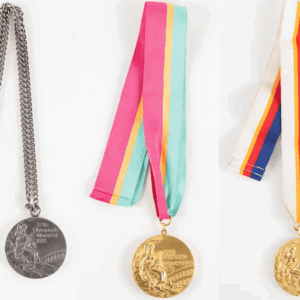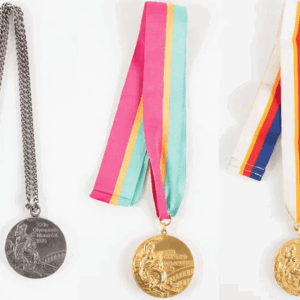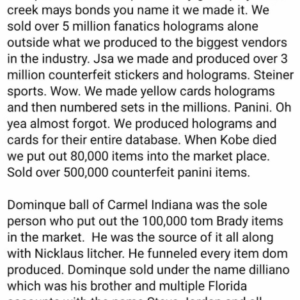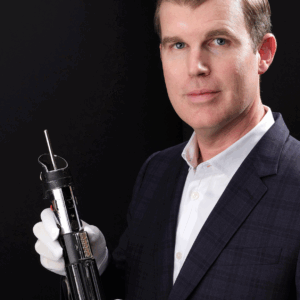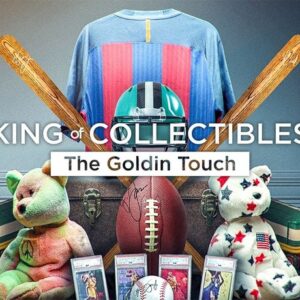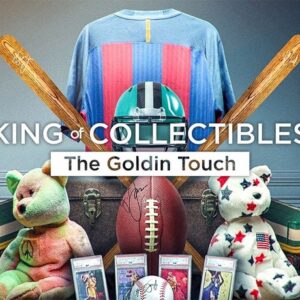The realm of sports memorabilia, usually characterized by nostalgia and the thrill of acquiring a rare piece of sports history, has been turned on its head in recent days. The once-thriving market has been abruptly shaken by a scandal of epic proportions originating from the Midwest, specifically Indiana. This scandal isn’t your average small-time forgery case; it is a grand tapestry of deception, weaved expertly by one Brett Lemieux, a man whose role as a seemingly reputable autograph dealer took a wild turn down the path of infamy.
Investigators tipped into the scandal during a dramatic police operation in Westfield, where they identified Lemieux as the epicenter of a far-reaching counterfeit memorabilia scheme. The narrative took a tragic note as Lemieux was discovered dead, allegedly from a self-inflicted gunshot wound, just as officers closed in with a search warrant. That grim finding, however, was merely the beginning.
There’s a disturbing irony in the fact that Lemieux, a man who lived by selling illusions, met his end amidst the unraveling of the greatest illusion he’d ever crafted. Authorities suspect that a post from Lemieux on the “Autographs 101” Facebook group was indeed a digital breadcrumb, leading to confessions of his orchestration of a fraudulent operation capable of flooding the market with over four million fake sports items. The declaration boasted an impossible-sounding $350 million in transactions, leaving collectors across the globe questioning the authenticity of their prized collections.
Operating under the bombastically-named Mister Mancave, Lemieux’s enterprise was quite the act, given its elusive storefront and incorporation attempts in Indiana. It was as if Mister Mancave wasn’t a shop but a spectacle—a front-row seat to a never-before-seen magic show in illusion and disguise.
Allegedly, the operation’s crown jewel was its ability to mimic those coveted hologram stickers from top authentication firms—an act akin to a magician’s sleight of hand. In a stroke of morbid timing, Lemieux confessed to launching 80,000 fraudulent Kobe Bryant items posthumously bearing authentic-looking holograms.
In short, Lemieux’s counterfeit operation wasn’t an exclusive club—it was a full-blown masquerade ball, attended by every major sport. His website flaunted deals like an Aaron Judge-signed ball, attractively priced lower than official listings, peppered with forged stickers to feign legitimacy. But to the trained eye, such prices were red flags—less a deal and more an ill-disguised trapdoor to the depths of deception.
For industry bigwigs like Fanatics, the scandal is a glaring neon sign for change. In response, they’ve subjected their hologram technology to stringent overhauls, designed to outsmart fraudsters and restore credibility to the market. They lean heavily on a team of law enforcement and predecessor FBI agents, collaborating to catch fakes before they sneak past security checks into collectors’ hands.
The numbers Lemieux presented have been greeted with skepticism by some. Doubters, like his competitive peers, balk at figures such as $350 million, dismissing them as unfathomable. Nevertheless, the reverberations of such a revelation bound with the sophisticated forgery methods shared in Lemieux’s “manifesto” do real harm to the community. Experts like Steve Grad view these ripple effects through a lens of gravity, conceding that the complexities of modern forgeries, like autopens, bring unsettling challenges to determining authenticity.
There were rumblings of awareness within the community that possibly hinted at Lemieux’s duplicitous dealings. Some dealers claim they smelled something fishy when Lemieux touted autographs from athletes absent from the signing circuit for years. Names like Dominique Ball and Nickolas Litscher surfaced as partners in crime in Lemieux’s declarations, though both strongly refute such connections, with Litscher taking legal steps to protect his reputation.
The conjecture around Lemieux’s networking web casts a long shadow over multiple businesses. Specters of names like Ultimate Sports and Signature Dog linger, suggesting a vast reach well beyond a solitary fraudster’s grasp, trailing counterfeit goods into every nook and cranny of the sports collectibles market.
In the aftermath of the scandal, something akin to a reverberating earthquake trembles through the world of collectors and dealers alike. Memory isn’t the sole currency here; authenticity is the true heavyweight. The debacle nudges everyone from novice collectors to seasoned connoisseurs to appraise their treasures with skepticism, yet a renewed vigilance electrifies the air—a testament to the timeless dilemma of verifying value in a world plagued with illusions.

